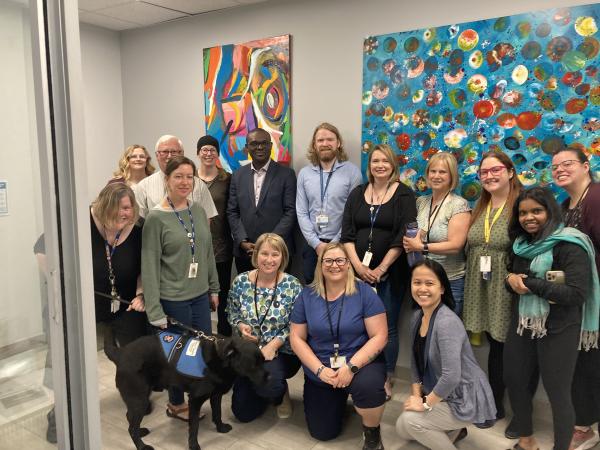Leadership safety rounds: Highlighting the importance of team cohesion in clients and staff safety

Leadership Safety Rounds (LSR) exist at Nova Scotia Health as an important tool for leadership and frontline staff to discuss safety concerns. This often includes concerns regarding the physical space of the service, the acuity of illness among clients, and the potential challenges of staffing.
The staff at Connections Halifax recently met with Mental Health and Addictions Program co-director Matthew White and Head of Psychiatry Dr. Vincent Agyapong for LSR. The team at Connections Halifax discussed how safety has been improved significantly since moving to their current space at Park Lane Mall and how this change has benefitted both staff and clients. What became obvious throughout the discussion is how cohesive the team is and the impact of team cohesion on staff safety.
Connections is a recovery focused program that provides supports and opportunities to adults living with severe and persistent mental illness, and who also experience substantial functional challenges in their day-to-day lives.
There are three teams based out of Halifax, Dartmouth, and Sackville. Staff reported that many of their clients also experience psychosocial stressors such as homelessness, financial struggles, and food instability.
Team members support clients in the community and often visit clients at their homes, at shelters, and at homeless encampments.
The potential safety concerns for visiting clients in the community are numerous and often unpredictable. Staff are often relying on the client’s description of their living environment to assess how safe it will be to visit them there. For clients living in shelters and homeless encampments, the risk increases as there is less knowledge regarding the others living among the clients. The staff at Connections Halifax identified these issues as potential risks to client and staff safety and explained how much they value the trust and unity they share as a team.
There were many examples of how quick team members are willing to support their colleagues by joining them on community visits, debriefing after a difficult situation, and stepping into to support during an emergency. Team members reported how much they learn from each other and that they feel confident in their colleague’s clinical decision making. When asked how the team became so cohesive, they responded by saying that Connections Halifax is a very respectful environment that encourages learning and skill building.
New employees receive a thorough orientation and are connected with a mentor. Registered Nurse, Mythily Johnson reflected on her experience at Connections Halifax and stated, “the benefits of working in a team that is so cohesive has shown that we can deliver safe, compassionate and comprehensive care to our clients who continue to face so many challenges.”
Connections Halifax is proud to be a team that has an open door and an approachable manager and leadership team. Staff also reported that they believe that for all these reasons, they have low staff turnover and feel that their roles are fulfilling and meaningful for the clients they serve and the colleagues they work with every day.
Johnson closes by saying “with many team members with years of experience in various settings, we are able to use our individual and combined clinical skills to collaborate and support our clients in a timely manner. As one of the newest members of this team, I recognize the importance of strong communication through trust, respect, and openness among the team members to enhance patient-centered care.”
Photo of Head of Psychiatry Dr. Vincent Agyapong and Connections Halifax staff.